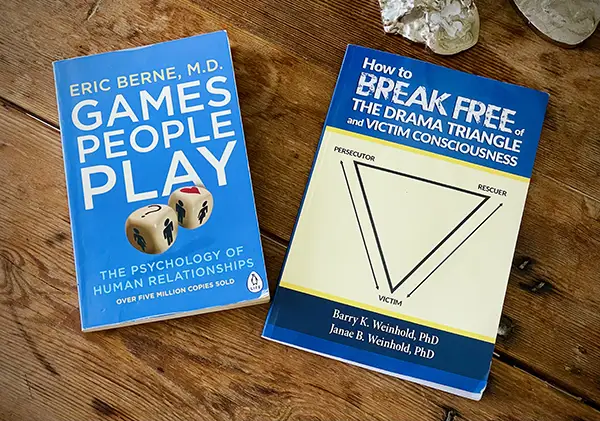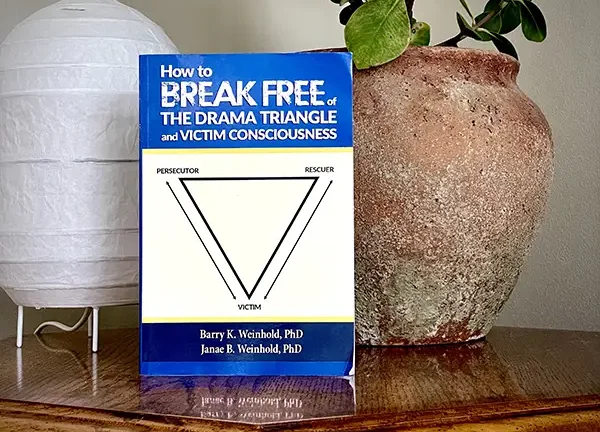What is the Drama Triangle?
The Drama Triangle in transactional analysis is like a map of dysfunctional interactions between people. Imagine three corners of a triangle labeled “Victim,” “Persecutor,” and “Rescuer.” In any drama, folks might play one of these roles:
Victim: “Poor me!“
Persecutor: “It’s all your fault!”
Rescuer: “I’ll save you!“
The tricky part? People can switch roles in the middle of a situation. It’s like a not-so-fun merry-go-round of blame, pity, and unnecessary heroics. The goal is to recognize when you’re in the Drama Triangle so you can step out of it and have healthier interactions.
Examples of The Drama Triangle.
Example 1: At work
Imagine a work scenario with three colleagues: David, Eliza, and Frank.
David misses a deadline for a project. He becomes the Victim: “There’s just too much on my plate! I can’t handle all this work alone.“
Eliza jumps in as the Persecutor: “David, this is the third time this month! You need to get your act together.”
Frank, trying to mediate, assumes the Rescuer role: “Calm down, Eliza. David, I’ll help you out this time to get the project done.“
Later, Frank might feel overwhelmed by taking on David’s work, and Eliza might criticize him for enabling David’s behavior. As before, roles can swap, and the cycle continues.
Example 2: Among friends
In a shared apartment, there’s a recurring issue with dirty dishes. Three roommates are Gina, Harry, and Irene.
Gina notices the sink full of dishes and thinks to herself, “I’m always cleaning up after them. It’s so unfair!” She’s playing the Victim.
Instead of talking to Harry and Irene directly, Gina vents to her friend, Jess.
Jess, who has heard this complaint multiple times, plays the Persecutor (even though she’s not directly involved): “Harry and Irene are so lazy! You shouldn’t have to deal with that.“
Later, Irene overhears Gina complaining and, without understanding the full context, decides to clean up. She thinks, “I’ll just do the dishes this time to keep the peace.” Irene takes on the Rescuer role.
Here, instead of Gina directly addressing the issue with Harry and Irene (which might lead to a solution or shared chore schedule), the Drama Triangle roles play out, sidestepping open communication and perpetuate the issue.
Example 3: Family
Paul starts off by playing the Persecutor after Riley comes home late: “You’ve broken the rules again! This is the third time this month!“
Riley immediately adopts the Victim role: “I’m always the one getting in trouble! Other kids get to stay out way later.“
Quinn tries to smooth things over, assuming the Rescuer role: “Let’s all calm down. Maybe we can reconsider the curfew time?”
However, the next day…
Quinn finds herself frustrated with Paul for not discussing parenting decisions together and steps into the Victim role: “You never involve me in decisions. It feels like I’m just a spectator in this family.”
Paul, feeling guilty and defensive, now becomes the Rescuer: “I’m sorry, I should have talked to you. Let’s decide together.“
Riley, sensing an opportunity and wanting to avoid future conflict, now becomes the Persecutor: “See, even Mom thinks the curfew is unfair! You just decided it without even thinking.”
Throughout the situation, the family members switch roles, muddying the waters of effective communication and making it challenging to address the root problem.
Books about the Drama Triangle and other Transactional Games

Transactional Analysis (TA) is a powerful psychological theory developed by Dr. Eric Berne that delves into the interactions and transactions between people. For those eager to gain a deeper understanding of this theory, two books stand out as must-reads. “Escape the Drama Triangle and Victim Consciousness” offers readers insights into the Drama Triangle – a social model that encapsulates three roles: Victim, Persecutor, and Rescuer. By understanding and navigating this triangle, individuals can break free from patterns that may limit personal and interpersonal growth. Another seminal work, “Games People Play,” by Eric Berne himself, explores the unconscious life scripts and games we enact in our daily interactions. By recognizing these games and understanding their underlying motives, readers can embark on a journey towards healthier and more authentic communication. Both books provide invaluable tools for anyone wanting to delve deep into the realm of Transactional Analysis. I have reviewed both Games People Play and written a summary of “Escape the Drama Triangle and Victim Consciousness” if you want to know more about these books.
Find more great books to read on my the Great Books List
Video Reviews every week on YouTube and support the BookLab mission on Patreon





